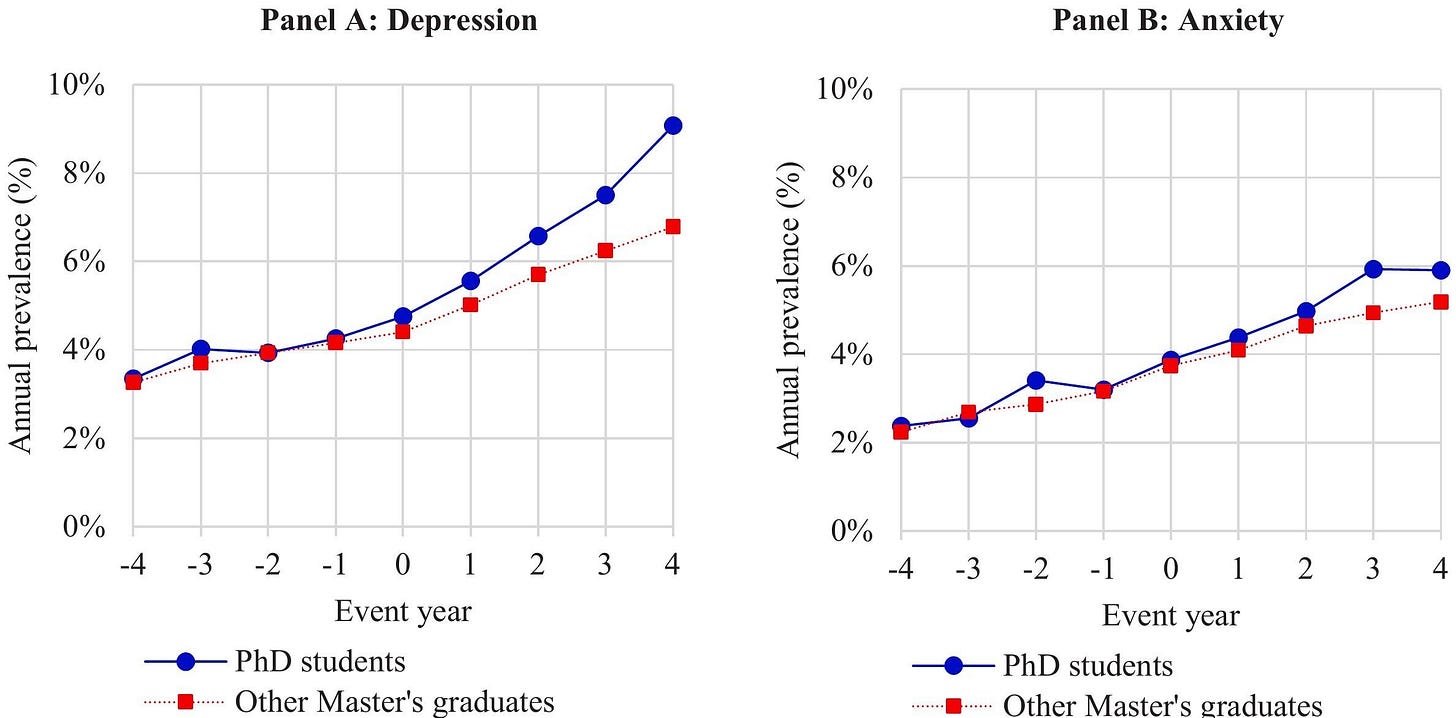"We find that all of the disparity in mental health emerges during the program."
Summary
This research paper examines the mental health of PhD students in Sweden using extensive administrative data on prescriptions, specialist care visits, hospitalisations, and causes of death. The authors compare the prevalence of depression, anxiety, and suicide among PhD students, Master's graduates not pursuing a PhD, and the general population. Their findings suggest that the prevalence of mental health issues among PhD students is lower than previously believed, but they still experience a higher rate of mental health problems compared to their peers. The authors conclude that the PhD program itself contributes to the deterioration of mental health among PhD students, and they offer policy recommendations for improving the program experience and providing targeted support interventions for specific groups.
Keloharju, M., Knüpfer, S., Müller, D., & Tåg, J. (2024). PhD studies hurt mental health, but less than previously feared. Research Policy, 53(8), 105078. https://doi.org/10.1016/j.respol.2024.105078

“The meta-analysis by Satinsky et al. (2021), which serves as our reference, includes 29 studies, of which 20 are from the US and only one from Europe. […]
Next, we explore the differences in PhD program structures between Sweden and the US, and their potential effects on the mental well-being of PhD students.”
Key findings
PhD studies have a negative impact on mental health, but less than previously thought. The study found that the prevalence of depression and anxiety among PhD students was lower than previous research has suggested. However, PhD students still had worse mental health than their peers who did not pursue doctoral studies.
The negative impact on mental health primarily emerges during the PhD program. The researchers found no significant differences in mental health between PhD students and their peers before they started their doctoral programs. However, PhD students' mental health declined after entering their programs, while the mental health of their peers remained relatively stable.
Women in PhD programs may experience a more significant negative impact on their mental health. The study found that women in PhD programs experienced a greater increase in anxiety compared to men in PhD programs. This suggests that there may be gender-specific factors that contribute to mental health challenges during doctoral studies.
The competitiveness of a PhD program does not appear to be a significant factor in students' mental health. There were no significant differences in mental health outcomes between students in more competitive and less competitive PhD programs.
International PhD students report lower rates of depression and anxiety. The reason for this finding is unclear, but it may be because international students are less likely to seek mental health services or because they continue to use health services in their home countries.
“Our work contributes to the literature by focusing on the prevalence and development of mental health issues among PhD students who face a unique set of challenges and pressures related to aspects such as resources, work methodologies, mentor relationships, and dynamics within the academic community suggest that the mental health issues of PhD students are linked to work and organizational contexts. More recent studies delve into these nuances of academic life, particularly mentoring and peer interactions”
Is this paper making use of the same data as the previous post?
The Key difference is that this article uses data spanning 2005–2015, while in the article from Bergvall et al. (see PhD studies & Mental Health (2) and URL) there is data from 2005–2016, and for some analyses includes data up to 2017.
This entry has been created by ResearchBud using NotebookLM.
The podcast has been generated by an artificial intelligence
The graph corresponds to the upper panel of the Figure 3. of the original paper.








Share this post